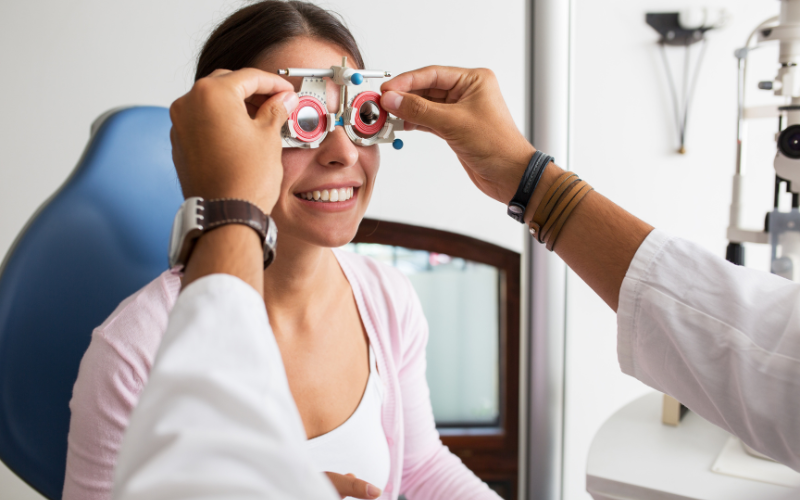Whether your child wears glasses or not, optometrists can play an important role in maintaining your child’s eye health.
In this blog, we will explore what optometrists do, how they differ from other eye health professionals, the services they provide, and the conditions they treat.
What is an Optometrist?
Optometrists are healthcare professionals who provide primary vision care ranging from visual acuity testing and correction with refraction, to the diagnosis, treatment, and management of vision changes. An optometrist is not a medical doctor. An optometrist receives a doctor of optometry (OD) degree after completing four years of optometry school, preceded by three years or more years of college. They are licensed to practice optometry, which primarily involves performing eye exams and vision tests, prescribing and dispensing corrective lenses, detecting certain eye abnormalities, and prescribing medications for certain eye diseases.
What services do optometrists provide?
Optometrists may provide a number of services that are important for maintaining the health of your child’s eyes, including:
Comprehensive eye exams
Optometrists check for various eye conditions and visual problems during a comprehensive eye exam. Eye exams typically start with a review of your medical history, followed by a series of tests to evaluate your visual acuity, refraction, and eye health.
These tests may include a visual acuity test using a Snellen chart, a refraction test to determine your prescription for glasses or contact lenses, and a dilated eye exam to check for eye diseases.
Optometrists use a range of tools to examine your eye structures. They will use these tools and devices to check the health of the patient’s eyes, including the retina, cornea, and optic nerve.
If any abnormalities are detected, optometrists will develop a treatment plan and provide recommendations for further care, including referrals to ophthalmologists or other healthcare professionals.
Prescription of corrective lenses
Optometrists also prescribe eyeglasses and contact lenses to correct vision problems. They determine the correct prescription by conducting a refraction test, which measures the patient’s ability to focus on objects at various distances.
The optometrist will then prescribe and dispense the right corrective lenses to correct your child’s vision, allowing them to see clearly and properly.
Detection and management of eye abnormalities and diseases
Optometrists play a critical role in detecting common eye conditions and abnormalities. After diagnosing an eye condition, optometrists will develop a treatment plan based on the severity of the disease and the patient’s overall health. Some of the specific services they may provide after a diagnosis include the following:
- Prescribing medications like antibiotics for an infection or anti-inflammatory drugs for allergies.
- Devising treatment plans for conditions such as strabismus or amblyopia.
- Referral to an ophthalmologist for specialized care or surgical interventions
- Provide pre-and post-operative care after surgery.
- Monitor the patients’ eye health.
- Educating patients about proper eye care and preventive measures.
Overall, optometrists play an essential role in maintaining good eye health and helping patients manage and prevent eye diseases and vision problems.
What is the difference between an optometrist and an ophthalmologist?
Optometrists and ophthalmologists are both healthcare professionals who specialize in providing eye care. However, there are some distinct differences between these two eye health professionals.
- Optometrists are primary eye care providers who typically hold a Doctor of Optometry (OD) degree. They are trained to perform comprehensive eye exams, diagnose and manage common eye conditions, and prescribe glasses and contact lenses.
Additionally, they can also prescribe medications to treat some eye conditions, but their scope of practice is generally limited to non-invasive procedures. Optometrists do not perform surgery.
- On the other hand, ophthalmologists are medical doctors (MDs) or doctors of osteopathy (DOs) who specialize in eye and vision care.
They are trained to diagnose and treat eye diseases and conditions, perform eye surgery, and prescribe medications. Therefore, they have a broader scope of practice than optometrists and can perform invasive procedures such as LASIK or eye muscle surgery.
Because of these differences in training and scope of practice, ophthalmologists are typically involved in the treatment of more complex eye conditions. On the other hand, optometrists may refer patients with these conditions to ophthalmologists for specialized care, or may work in conjunction with an ophthalmologist, as a team.
Both optometrists and ophthalmologists are important healthcare providers in the field of eye care. They work together to provide comprehensive eye care services, each bringing their unique set of skills and expertise to the table.
Together, they provide comprehensive care to help patients maintain good eye health and preserve their vision.
What is special about our optometrist?
Our optometrist is trained to work specifically with children and their unique set of conditions and needs. Our optometrist treats amblyopia and can recognize and refer or treat strabismus conditions, depending on the cause.
Our optometrist specializes in treating and managing myopia, by monitoring it, prescribing glasses, prescribing Dilute Atropine, prescribing MiSight contact lenses, as well as other types of contact lenses.
So, we encourage every parent and guardian to prioritize their child’s eye health by scheduling a comprehensive eye exam with the best pediatric eye doctors in NJ at Pediatric Eye Associates.
Contact us now to learn more!
The material contained on this site is for informational purposes only and DOES NOT CONSTITUTE THE PROVIDING OF MEDICAL ADVICE, and is not intended to be a substitute for independent professional medical judgment, advice, diagnosis, or treatment. Always seek the advice of your physician or other qualified healthcare providers with any questions or concerns you may have regarding your health.

